West Midlands Grammar Schools 11 plus guide

Are you considering a grammar school in the West Midlands for your child? We’ve collated everything you need to know about admissions in 2025–2026. Keep reading to:
- Find out more about grammar schools in the West Midlands
- Learn about the West Midlands Grammar Schools Entrance Test (11 plus)
- Discover which subjects your child will be tested on
- Plus, get exclusive resources to help your child prepare!
What is the West Midlands Grammar Schools Entrance Test?
The West Midlands Grammar Schools Entrance Test is an 11 plus exam used by 18 grammar schools and one partially-selective school in the West Midlands. There are eight grammar schools in Birmingham, six in Warwickshire, and five in the Shropshire, Walsall and Wolverhampton area. Your child will only have to take the entrance test once, regardless of how many grammar schools within the partnership you’re applying to.
The West Midlands Grammar Schools Entrance Test is designed to be challenging. Grammar schools use the 11 plus to select children working in the top ability range in their year group. Children who are within the top 25% of their year group are normally well-suited for grammar school.
The 11 plus exam takes place in September, when your child is in Year 6. Children who were born between 1st September 2014 and 31st August 2015 will take the West Midlands Grammar Schools Entrance Test on Saturday 13th September 2025 for Year 7 entry in September 2026. Children will be allocated a session either in the morning or afternoon. You should receive confirmation of your child’s allocated slot by early September.
Which schools use the West Midlands Grammar Schools Entrance Test?
There are three grammar school consortiums in the West Midlands. All three consortiums are part of the West Midlands Grammar Schools partnership and share the same 11 plus exam.
The Grammar Schools in Birmingham
- Bishop Vesey’s Grammar School
- King Edward VI Aston School
- King Edward VI Camp Hill School for Boys
- King Edward VI Camp Hill School for Girls
- King Edward VI Five Ways School
- King Edward VI Handsworth Grammar School for Boys
- King Edward VI Handsworth School for Girls
- Sutton Coldfield Grammar School for Girls
Shropshire, Walsall and Wolverhampton Consortium
- Haberdashers’ Adams
- Newport Girls’ High School
- Queen Mary’s Grammar School
- Queen Mary’s High School
- Wolverhampton Girls’ High School
Warwickshire Consortium
- Alcester Grammar School
- Ashlawn School
- King Edward VI School, Stratford-upon-Avon
- Lawrence Sheriff School
- Rugby High School
- Stratford Girls’ Grammar School
Dates for your diary
- Tuesday 6th May 2025: registration opens for the West Midlands Grammar Schools Entrance Test
- Friday 13th June 2025: reasonable adjustments deadline
- Friday 27th June 2025: test registration closes
- Saturday 13th September – Monday 15th September 2025: West Midlands Grammar Schools Entrance Test
- Mid-October 2025: parents receive test results
- Friday 31st October 2025: secondary school applications close at 5pm
- Monday 2nd March 2026: secondary school national offers day
Dates can vary, so always check with your target schools!
What's on the West Midlands Grammar Schools Entrance Test?
The West Midlands Grammar Schools Entrance Test consists of two papers provided by GL Assessment. Most grammar schools in the UK use 11 plus papers provided by GL Assessment.
Each test lasts around one hour. This includes time for instructions, some worked (unmarked) example questions, and the real test questions. Your child will take both tests on the same day. There is a short break between the two papers.
The two papers are divided into smaller, individually timed sections. These assess:
- English comprehension: your child will need to read a passage of text and answer questions to demonstrate their understanding
- Maths: questions will be based on the topics taught on the Key Stage 2 national curriculum
- Verbal reasoning: your child will need to use logic and reasoning to solve problems with written information, such as letters, words, symbols and numbers
- Non-verbal reasoning and spatial reasoning: this involves using logic and reasoning to solve problems with visual information, such as pictures, shapes and diagrams
All of the questions in the West Midlands Grammar Schools Entrance Test are multiple-choice. Your child will have separate answer sheets, which they will use to mark their answers. These are marked electronically.
Is your child ready for the West Midlands Entrance Test?
See where they stand in minutes. Atom’s free West Midlands 11+ practice assessment gives you an instant breakdown of their strengths and gaps. Know exactly what to focus on next and start preparing with direction, not uncertainty.
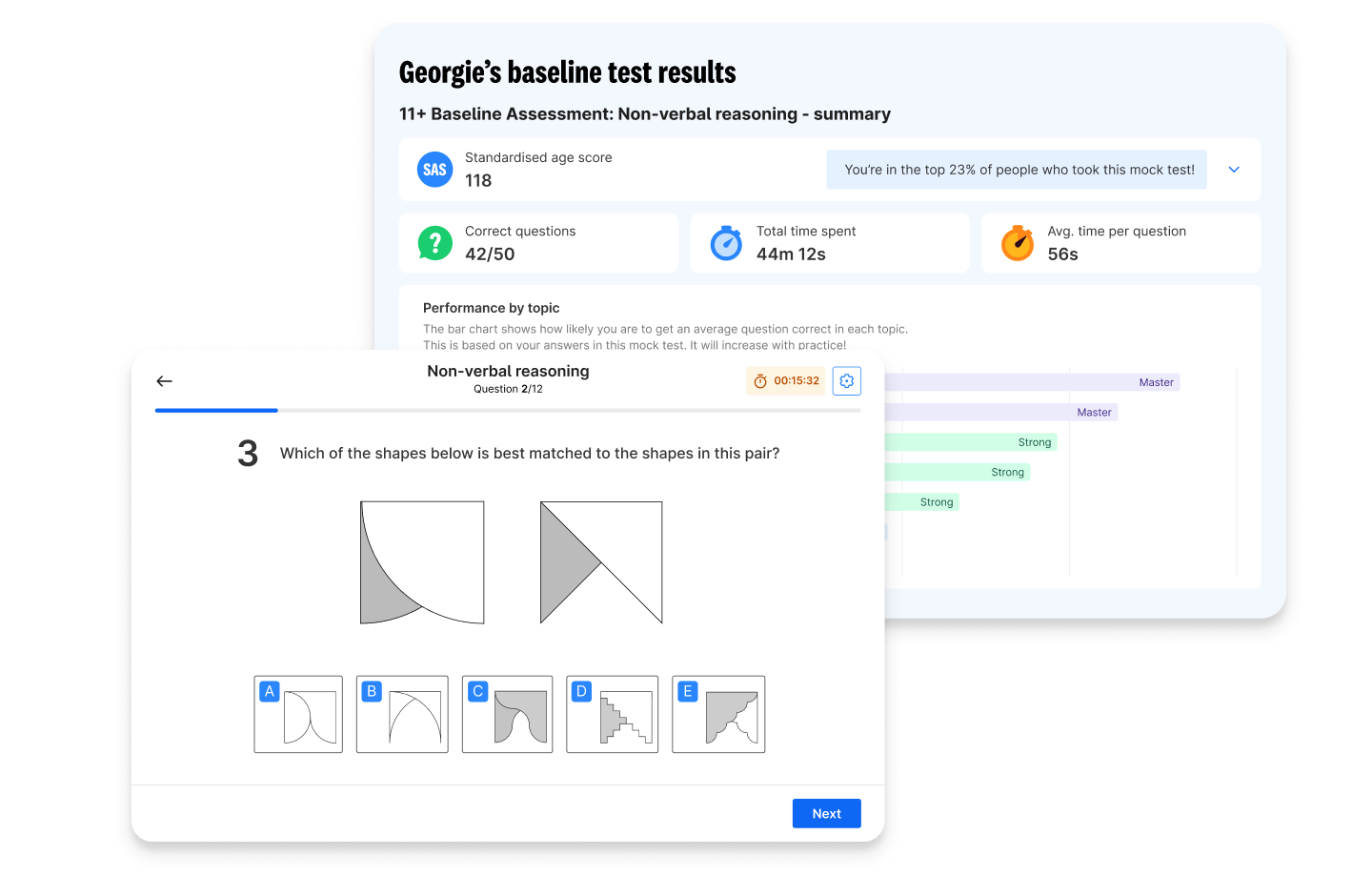
How is the West Midlands Grammar School’s Entrance Test scored?
After the test, your child’s answer sheets are marked using Optical Mark Recognition (OMR). This technology picks up the marks your child has made to indicate which answers they think are correct. Your child receives a mark for every correct answer.
The marks are then weighted for each section:
- English and verbal reasoning: 50%
- Non-verbal reasoning: 25%
- Maths: 25%
These weighted scores are age-standardised to take into account differences in age. Age-standardisation is a common practice in 11 plus scoring and ensures younger children aren’t disadvantaged.
Your child’s results will be emailed to you in mid-October 2025. If your child meets your target school’s qualifying standard, you can then apply for a place on your common application form (CAF).
What's the pass mark for the West Midlands Entrance Test?
Each school, or group of schools, sets its own cut-off score which qualifies a child for entry. This isn’t always decided until after the entrance test takes place.
The minimum qualifying scores for Year 7 entry in 2024 were:
- The Grammar Schools in Birmingham: 205
- Shropshire, Walsall and Wolverhampton Consortium: 200
- King Edward VI School: 232
- Stratford Girls’ Grammar School: 226
- Alcester Grammar School: 220
- Lawrence Sheriff School: 212
- Rugby High School: 212
- Ashlawn School: 208
Achieving the qualifying score doesn’t guarantee that your child will be allocated a place at your target school. Many grammar schools are oversubscribed with children who meet the qualifying score. When this happens, the school applies oversubscription criteria to prioritise places. We’ve included this information in each of our school guides:
- Alcester Grammar School
- Bishop Vesey’s Grammar School
- Haberdashers’ Adams
- King Edward VI Aston School
- King Edward VI Camp Hill School for Boys
- King Edward VI Camp Hill School for Girls
- King Edward VI Five Ways School
- King Edward VI Handsworth Grammar School for Boys
- King Edward VI Handsworth School for Girls
- King Edward VI School, Stratford-upon-Avon
- Lawrence Sheriff School
- Newport Girls’ High School
- Queen Mary’s Grammar School
- Queen Mary’s High School
- Rugby High School
- Stratford Girls’ Grammar School
- Sutton Coldfield Grammar School for Girls
- Wolverhampton Girls’ High School
How to apply to grammar schools in the West Midlands
If you're considering a grammar school in the West Midlands for your child, it's a good idea to speak to your child's teacher first.
Grammar schools are academically-selective and select children working towards the top of their year group. Your child's teacher will be able to indicate whether they think your child will be able to keep up with the pace in a grammar school.
1. Register for the West Midlands Grammar Schools’ Entrance Test
If you would like your child to be considered for a place at one of the 19 West Midlands grammar schools, you’ll need to register them to take the local 11 plus.
Registration for the 2025 exam will open on Tuesday 6th May 2025. To start your child’s application, visit the West Midlands Grammar Schools website and follow the instructions. You may need to have a photo of your child ready to upload to the admissions policy.
2. Apply for school places
Your child’s test results will be sent to you in mid-October. You’ll find out if your child has achieved the minimum score necessary for admission to your target school(s).
You can use these results to decide which schools to name on your secondary school common application form. You should only name grammar schools for which your child has met the eligible score. Before listing a school on your form, check its admissions policy and make sure your child is eligible.
The application form must be submitted to your home local council by 5pm on Friday 31st October 2025.
3. National school offer day
On 2nd March 2026, you will find out which school your child has been allocated a place at. They will be allocated a place at your highest-preferred school for which they meet the entry criteria and which has places available.
If no places are available at your preferred schools, they will be offered a place at another school in your area. You can appeal via an independent panel. Information about how to appeal will be sent to you by your local authority along with your school offer on National Offers Day.
How can I help my child prepare for the West Midlands Grammar Schools Entrance Test?
The 11 plus exam is designed to be challenging. Here are our top tips to help your child prepare for the West Midlands Grammar Schools Entrance Test in September 2025.
Bitesize learning
It’s important to build a good knowledge base before the exam. Using a ‘little and often’ approach when learning is key – our brains encode new information more effectively when dealing with smaller ‘chunks’ of information. For children aged 10–11, child psychologists recommend regular study sessions of 20–30 minutes.
Atom Home makes learning a more enjoyable process for your child. They'll explore exciting worlds full of interactive questions, earning coins to spend in the Atom shop. Atom adapts to your child, showing them questions at just the right level of difficulty to keep them motivated.
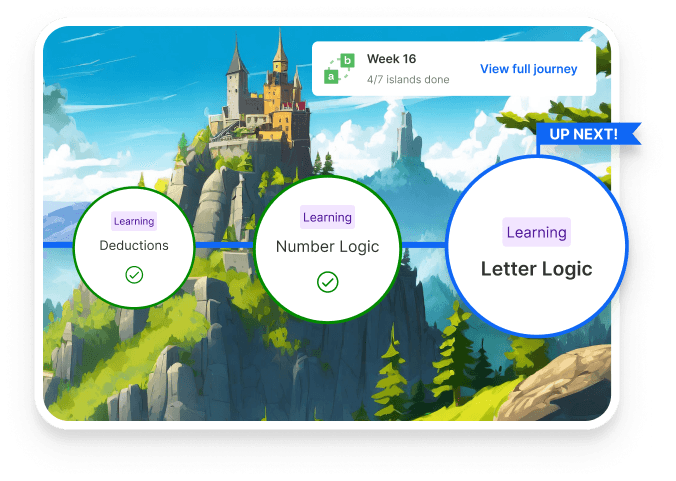
Read widely
11 plus exams test your child’s ability to analyse and interpret written information. Regular reading is a great way to help your child build these skills.
Encourage them to read books from different genres and by a diverse range of authors. Increasing the variety of your child’s reading will help them understand different styles, tones and purposes. Meanwhile, reading a little every day will help widen their vocabulary, sharpen their analytical thinking, and enhance their imagination.
Refine exam technique
When your child feels confident with the topics they’ve learnt in Year 5, they’ll be ready to put their knowledge to the test.
Practice tests can help your child develop problem-solving skills and build confidence working under test conditions. They’re also a great way to consolidate learning and highlight knowledge gaps for further improvement.
With Atom Home, you'll unlock online mock tests and printable practice papers. Enjoy automatic marking and progress tracking with the online tests, and help your child get familiar with the real exam experience with printable practice papers.
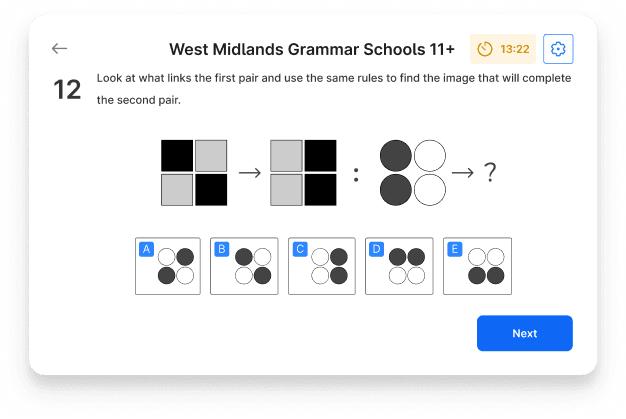
Celebrate progress
Setting regular, achievable goals and celebrating your child’s progress – no matter how big or small – will help keep their motivation high.
Make sure to encourage a growth mindset. This means celebrating effort, as well as achievement! When your child makes mistakes or struggles to understand a particular topic, help them understand that they’ll improve through practice. Regular praise will help your child improve their resilience when tackling new and challenging topics.
Take control of your child’s 11+ preparation.
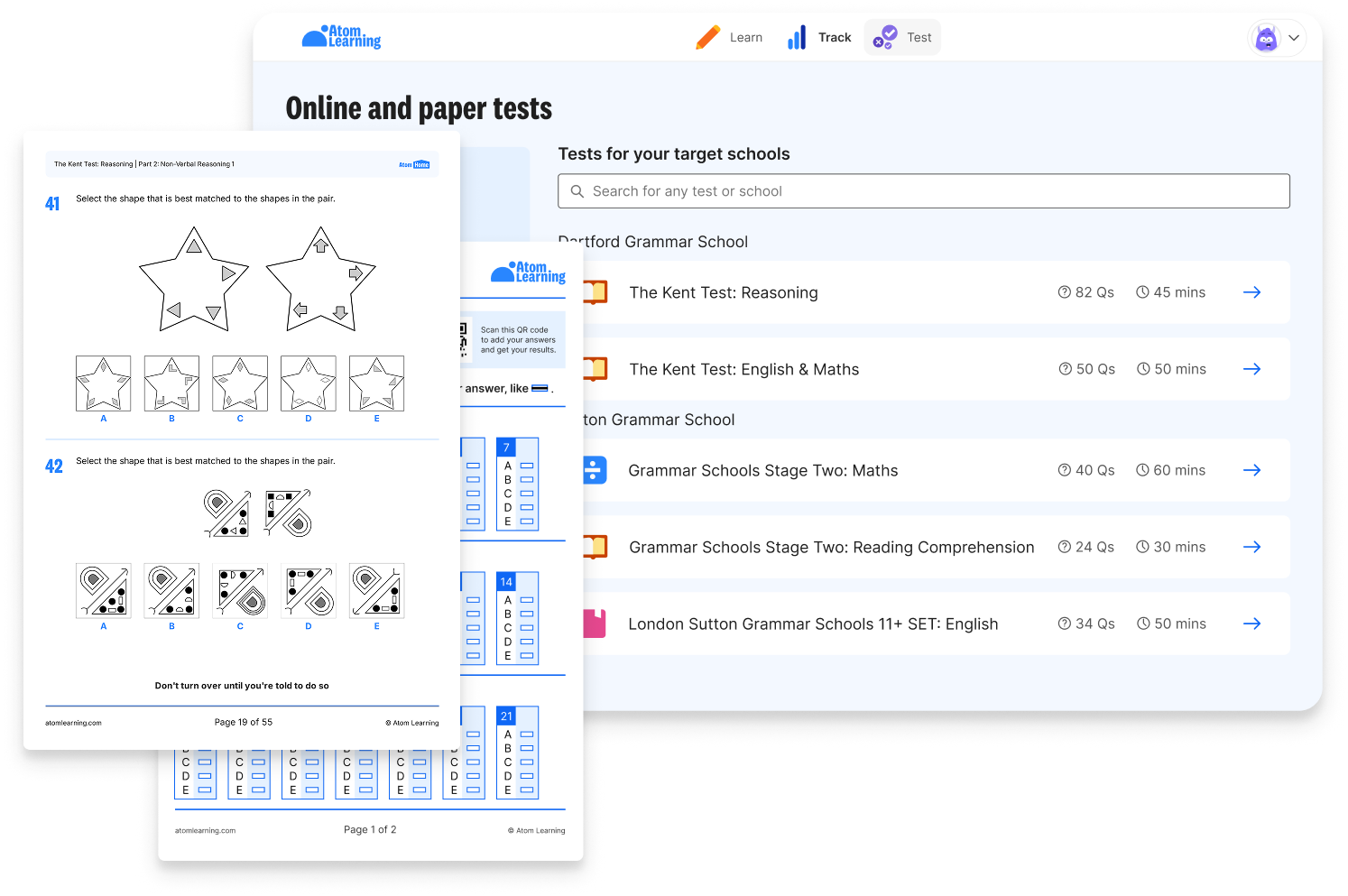
Not sure if your child is on track for the grammar school 11+? You don’t need to guess what to cover or whether they’re ready. Atom shows you exactly what to practise each week and how they’re performing, so you can stay ahead of the process without the stress.
- Follow personalised weekly exam plans that show them what to learn next.
- Download replica 11+ practice papers and upload a photo for instant, stress-free marking.
- Track progress and see how they compare to others applying to the same schools.
Start your free trial and help your child feel fully prepared for the 11+.


